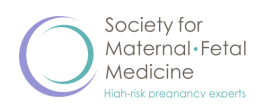
Posted 9/25/23
The Society for Maternal-Fetal Medicine (SMFM)
Respiratory syncytial virus (RSV) is a leading cause of lower respiratory tract illness in children under 5 years. Each year, RSV contributed to approximately 58,000 hospitalizations, and infants aged 6 months and younger experience the most severe morbidity and mortality. Until recently, prevention was limited to infants with high risk conditions.
On September 22, 2023, the Center for Disease Control and Prevention’s Advisory Committee on Immunization Practices recommended the bivalent recombinant respiratory syncytial virus prefusion F protein subunit (RSV preF) vaccine for pregnant people during 32-36 weeks of gestation, using seasonal administration, to prevent RSV lower respiratory tract infection in infants. This is one of two new products authorized by the FDA for the prevention of RSV in infants. The second is the monoclonal antibody, nirsevimab.
In clinical trials, the efficacy of RSV preF vaccine against RSV-related illness and hospitalization was 70.9% (97.58% CI 44.5 – 85.9) at 150 days. The efficacy of nirsevimab was 79.5% (95% CI 65.9 – 87.7). Side effects from vaccination were low, however, there was a signal regarding the risk of preterm birth. In the MATISSE study, a nonsignificant difference in preterm birth occurred in the vaccine group compared to controls (201/356 (5.7%) in vaccine vs 169/3558 (4.7%) in control, Relative Risk 1.19, 95%CI 0.97 – 1.45) and was only observed in low- and middle-income countries participating in the trial. Of these, 60% of preterm birth occurred greater than 30 days following vaccination and 90% occurred between 34 – 37 weeks of gestation. There was no difference in neonatal deaths (<0.3%). Additionally, data regarding lactation and infant protection through breastmilk were not evaluated.
Reducing the burden of RSV in infants and their families is an important health priority. The Society for Maternal-Fetal Medicine (SMFM) supports vaccination as part of a multicomponent approach against RSV illness in infants and towards reducing the disproportionate burden of RSV in communities.
Patients should be counseled that vaccination is a safe and effective way to prevent RSV related lower respiratory tract disease in infants from birth through 6 months of age. Patients should be counseled regarding the uncertainty of preterm birth, and that the data are insufficient to establish or exclude a causal relationship. Patients should be counseled regarding the lack of data concerning breastfeeding, but that infant protection is expected. In patients who so choose, the RSV preF vaccine should be administered from 32 through 36 weeks during pregnancy.
Patients should also be aware of the option for nirsevimab. With few exceptions, infants whose
birthing parent received the vaccine will be ineligible for nirsevimab. Patients should be made
aware that several implementation barriers, including cost, may preclude infant access. However,
parents who opt for nirsevimab and have confirmed availability through their birthing hospital or
pediatrician should be supported in this decision.
Formal recommendations from CDC are pending. The SMFM will continue to monitor FDA and
CDC recommendation and will provide further updates on clinical considerations.